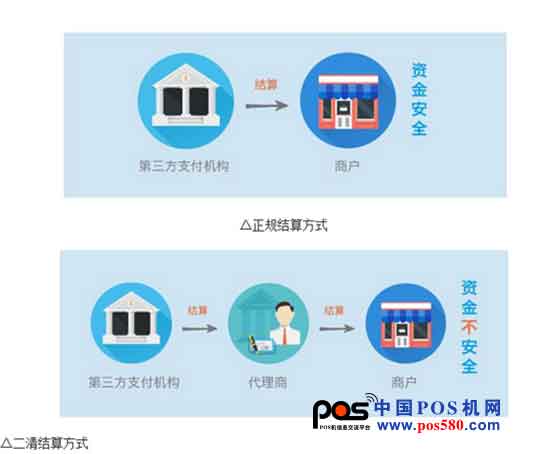Counting the mobile payment market violations, all give professional advice

In the second quarter of 2016, the transaction volume of China's third-party mobile payment market exceeded RMB 75 trillion, a year-on-year increase of 116%. On the one hand, no card payment, two-dimensional code transactions are extremely hot, on the other hand, there are only 267 units with third-party payment licenses in the country, it is difficult to penetrate the shops in various regions of the country, so a large number of agent-receiving institutions came into being. With the rapid promotion of payment services, there are some irregularities in the industry. What are the main categories? What are the consequences of these non-compliance practices, and how will ordinary merchants prevent them?
First, the set of code
The set code is mainly carried out through the POS machine payment channel. The reason why the set code exists is because there is a difference in the rate of using the bank card collection in different industries. To put it simply, the acquiring institution provides low-rate "MCC codes" (ie, merchant category codes) for merchants in high-rate industries. For example, in a catering store, the original bank card credit card needs to use the food and entertainment rate, that is, 1.25%. After applying the livelihood rate, it is reduced to 0.38%, which reduces the cost for the merchant.
This kind of non-compliant operation method, in an inappropriate way to the merchants to offer low-cost behavior, although in the short term can help agents to obtain a large market share, but in the long run, will form a price war-based The market competition pattern has caused the relevant institutions in the industry to generally ignore the compliance operation and service improvement, which will eventually lead to chaotic industry and market development into a vicious circle. At the same time, the phenomenon of agent's random set-up will cause the background transaction data to be generally distorted, which is not conducive to the monitoring agency to monitor the payment risk, thus contributing to a series of illegal activities such as cashing and pseudo-cards, which brings hidden dangers to the people's financial security.
Therefore, at the beginning of this year, the National Development and Reform Commission and the central bank jointly issued the "Notice on Improving the Pricing Mechanism for Bank Card Credit Card Fees", stipulating that the card fee for bank card processing will be adjusted from September 6, 2016, and the acquiring institution will be cancelled to the merchant. According to the industry classification, the "MCC" pricing of handling fees is charged. The market generally believes that this will lead to a reduction in arbitrage space and the market will tend to be clear.
Some views believe that in the past, violations have occurred, and the non-compliance agencies will be punished by restrictions on business areas or fines, but they have not been suspended from the entire organization, and the regulatory attitude is relatively mild. However, all of them believe that moderate attitudes are only superficial phenomena. The intention of supervision is very clear. In the case of ensuring market stability, efforts are gradually increased to strengthen control in this area, forcing some institutions to rectify, transform, or abandon the market, so that some will Have the ability to operate in compliance.
Second, second clear
The second clearing, that is, the second liquidation, refers to a mode in which the unit or individual that has not obtained the central bank's payment for business license actually engages in the payment business with the support of the licensed acquiring institution. The difference between it and the clearing is that there is one more in the settlement. Unqualified transfer order. The original transaction funds are directly liquidated to the merchant by a qualified payment institution. If the second clearing method is adopted, the transaction funds are first liquidated to the agent, and then the agent is liquidated to the merchant.
This kind of liquidation method will make a large amount of funds accumulate in the Erqing organization and be free from the control of the payment and settlement qualification institutions such as banks. The risk of the second clearing mode is that the institution may pretend to use the name of the merchant in the name of the merchant, and more importantly, Once there is a problem with the operation of the Erqing organization, it is very likely that the phenomenon of interception and misappropriation of merchant funds will result, and the merchants will not be able to get the settlement payment.

It is worth mentioning that there may be Sanqing, Siqing, Wuqing, etc. under the Second Qing. There is one more risk for each settlement procedure of funds. Therefore, the central bank released the management of network payment services for non-bank payment institutions in December 2015. The Measures limit the stock of virtual accounts, so that large amounts of funds are always under the control of the central bank to ensure the safety of funds. In April 2016, the “Implementation Plan for the Special Rehabilitation Work of Non-Bank Payment Institutions†was issued, which clearly stated the time for rectifying the “Second Clearance†phenomenon, and stated that there is no evidence for the large scale of business, hidden risks of capital risks, and failure to cooperate with the actions of the regulatory authorities. The institution will be banned according to law. Its regulatory objectives are directed at total bans.
Regarding how to identify the agents of Erqing, the advice of the two companies can focus on two aspects: First, the merchant should see whether the institution that signed the collection and payment agreement with him has the corresponding authorization certificate. This certificate is generally issued by the bank or a third-party payment institution. If the relevant certificate cannot be provided or the validity cannot be judged, it is necessary to pay attention to the payment account of the daily settlement fund to see if the account is an institution with liquidation qualification. This institution is generally a bank or a third-party payment institution. It is the account of other companies. This agent is likely to be the agent of Erqing.
Third, cash out
Cashing out is the abbreviation of cash withdrawal, which refers to the act of directly paying cash to a credit card holder by fictitious transaction, false price, cash return, etc. by using the point-of-sale terminal (POS machine) in violation of state regulations. Compared with loans from financial institutions, this method is convenient to operate, has low commission fees, and is exempt from paying interest on borrowing during the interest-free period.
All of them remind cardholders that cashing is illegal and will cause great harm to the social financial order: First, the funds that will be cashed out will be outside the bank's risk monitoring system, which will greatly increase the risk of the bank, which is not conducive to The stability of the national financial order is also not conducive to the financial security of ordinary people. Secondly, if the credit card cash is not returned on time, the overdue interest will be much higher than the overdraft interest, and the repayment information will be included in the PBOC system, and the cardholder will bear the risk of personal credit loss.
All of them believe that the regulation and control of the payment industry will become more and more strict, and the informal payment or agency business scope will be compressed, and may be integrated or even forced to withdraw from the market, so they serve It is also risky for merchants. The same is the use of pos machine or two-dimensional code for collection, the choice of different agents may mean different consequences, in the current environment, only the formal operators can survive the survival of the fittest, provide long-term stability for merchants Service.
Foil Shaver,Electric Premium Shavers,Portable Shaver Electric,Pearl Mini Shaver
ZHEJIANG SHENGFA ELECTRIC APPLIAMNCES CO.,LTD , https://www.sfelectricappliances.com